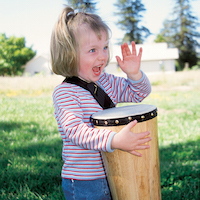
"Music matters. Encourage your child to listen to all kinds of music and to clap, dance and sing along."
—Tim Seldin, How to Raise an Amazing Child
 From the soft chimes inside their soft, furry toys to the full orchestration of "Carnival of the Animals, " children learn how to distinguish different sounds, rhythms, and melodies. The soothing songs of lullabies sung by mom or dad help them feel loved and fall asleep. At the same time, children are learning that putting different notes together forms a tune, just like putting words together forms a thought.
From the soft chimes inside their soft, furry toys to the full orchestration of "Carnival of the Animals, " children learn how to distinguish different sounds, rhythms, and melodies. The soothing songs of lullabies sung by mom or dad help them feel loved and fall asleep. At the same time, children are learning that putting different notes together forms a tune, just like putting words together forms a thought.
Children unconsciously assimilate and often imitate whatever they come into contact with, which is why it's so important to expose your children to music:
Music and learning go hand in hand. Brain research supports the relationship of a child's increased ability to distinguish sounds through their exposure to nursery rhymes and simple songs. But the most important factor is interaction with another person, whether it be a sibling, parent, classmate, or teacher. Young children learn best by imitating real people, not those seen on screens.
Sit down with your child to explore a musical instrument, pointing out its unique features. For example, a rain stick can create a soft or pounding rain sound, depending on how you move it. Play a familiar tune together as you learn to play a lap harp with help from the guide sheet showing which strings to pluck. Create duets on your harmonicas or triangles. The possibilities are endless!
Music has the ability to entertain. You may have noticed how your child responds to music and intuitively picks up the rhythm. At age three, one of my grandson's favorite pastimes was to turn on the radio and dance to the music. His moves were unique, to say the least, and the energy expended was enormous. He would dance through the house for 20 or 30 minutes, occasionally using props to mimic the beat.
Pass on the songs from your childhood: "Rock-A-Bye Baby, " "Old MacDonald Had a Farm, " or "Raindrops Keep Falling on My Head." Memories of a family tradition might be associated with a song. My grandma, for example, always sang "Good Morning to You" on the mornings I slept at her house. Now I often greet my grandchildren this same way. Learning the music of one's cultural and family heritage is rich and varied. Whenever I hear "This Land Is Your Land, " I'm reminded of the Fourth of July picnics we had. Songs learned at an early age stay with us forever.
Keep playing music. When you do, keep it simple, and remember that play is the operative word. Have fun as you expose your children to the many varieties of music. Sharing music will enrich your lives and help your children feel cherished as you sing, play, and listen together.
—by Jane M. Jacobs, M.A., Montessori Educational Consultant at Montessori Services. She is a trained primary Montessori directress and also a Licensed Marriage and Family Therapist. She has taught children aged 2 to 7 years in Montessori schools, Headstart, and also in a preschool for children with developmental challenges. In her counseling practice, she helps individuals, couples, and families.
—Originally Published 2017